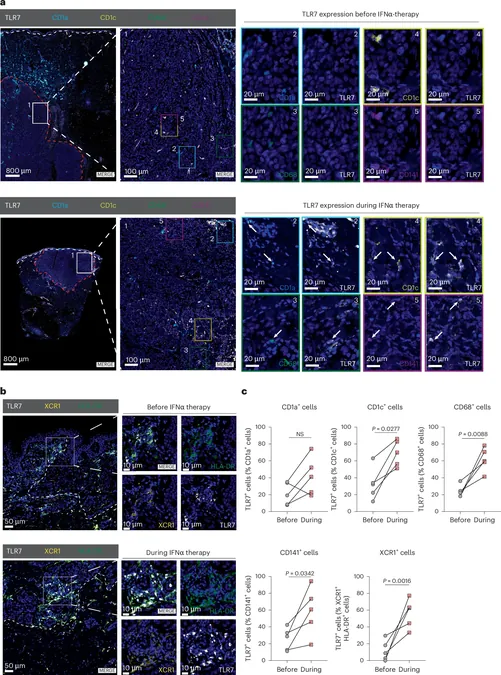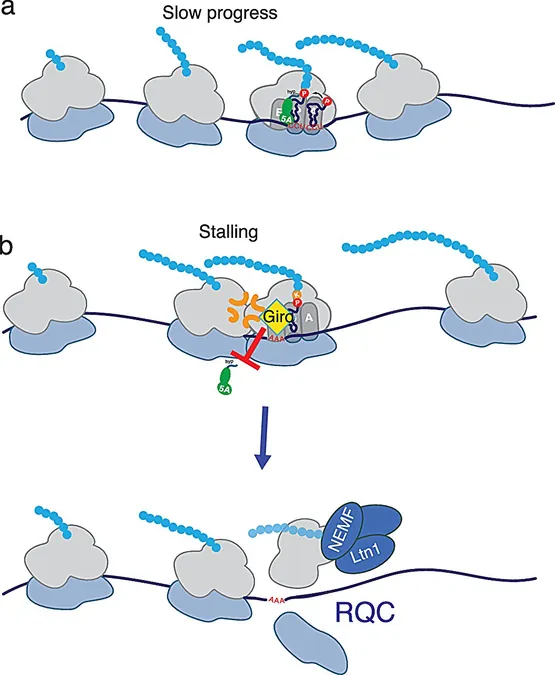
Breakthrough Combination Therapy Shows Promise in the Fight Against Melanoma and Breast Cancer!
2025-01-23
Author: John Tan
Introduction
In an exciting development for cancer treatment, a groundbreaking study from the Medical University of Vienna reveals a new combination immunotherapy that offers fresh hope for melanoma and breast cancer patients. Led by acclaimed researcher Maria Sibilia, this innovative approach merges systemic administration of the tissue hormone interferon-I with topical application of Imiquimod, a treatment that has shown remarkable results in preclinical trials involving mouse tumor models.
Study Findings
The study, recently published in the prestigious journal *Nature Cancer*, unveils how this dual therapy not only induces tumor cell death at the site of application but also activates the body's adaptive immune system to combat distant metastases—cancer cells that spread to other parts of the body.
Immunotherapy Overview
Immunotherapies have gained substantial traction in recent years, revolutionizing cancer care for many. Nevertheless, certain patients continue to experience limited effectiveness with these treatments. Recognizing this issue, Dr. Sibilia and her research team set out to explore the synergistic potential of pairing interferon-I with Imiquimod, an agent that stimulates the immune system by activating specific receptors (TLR7/8) commonly associated with innate immunity.
Mechanism of Action
In their experiments using melanoma and breast cancer models, the researchers observed that Imiquimod effectively activates plasmacytoid dendritic cells (pDCs), which in turn produce interferon-I, enhancing the overall anti-tumor immune response. This potent combination not only inhibited the formation of new blood vessels—a process critical for tumor growth—but also prime neighboring dendritic cells and macrophages, intensifying the localized immune response against tumors.
Significant Results
Impressively, the results indicated a significant reduction in the formation of new metastases. This could herald a new era of treatment where patients might not only see their primary tumors shrink but also experience fewer relapses due to distant spread. Furthermore, the therapy enhances the sensitivity of melanomas to existing checkpoint inhibitors, a class of drugs designed to unleash the immune system against cancer cells.
Expert Opinions
Maria Sibilia emphasizes the implications of these findings, stating that this combination could significantly broaden treatment options for patients battling locally accessible tumors, making it a game-changer in oncology.
Co-first author Philipp Novoszel added that the topical treatment of the primary tumor with Imiquimod is critical for maximizing the efficacy of the systemic interferon-I therapy, addressing not only the site of the tumor but also attacking metastatic cells throughout the body.
Future Directions
Looking ahead, Dr. Sibilia expressed her commitment to further developing these immunotherapeutic strategies to improve outcomes for patients who have not yet benefited from standard therapies. Martina Sanlorenzo, a leading dermato-oncologist involved in the study, pointed out the strong foundation for clinical application, emphasizing that the similarity in dendritic cell activation observed in their preclinical models provides a hopeful outlook for treating human patients.
Conclusion
As researchers continue to unravel the complexities of cancer and enhance treatment precision, this promising combination therapy stands as a beacon of hope, potentially transforming the landscape of treatment options available to those grappling with melanoma and breast cancer. Stay tuned as we follow this groundbreaking study and its path toward clinical application!




 Brasil (PT)
Brasil (PT)
 Canada (EN)
Canada (EN)
 Chile (ES)
Chile (ES)
 Česko (CS)
Česko (CS)
 대한민국 (KO)
대한민국 (KO)
 España (ES)
España (ES)
 France (FR)
France (FR)
 Hong Kong (EN)
Hong Kong (EN)
 Italia (IT)
Italia (IT)
 日本 (JA)
日本 (JA)
 Magyarország (HU)
Magyarország (HU)
 Norge (NO)
Norge (NO)
 Polska (PL)
Polska (PL)
 Schweiz (DE)
Schweiz (DE)
 Singapore (EN)
Singapore (EN)
 Sverige (SV)
Sverige (SV)
 Suomi (FI)
Suomi (FI)
 Türkiye (TR)
Türkiye (TR)